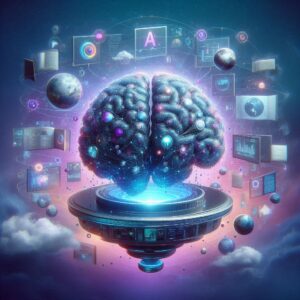Unlock the Full Potential of AI to Transform Your Content Creation: Merging Technology with Human Insight
The realm of AI-driven content creation is undergoing a significant transformation, fundamentally changing how we interact with digital platforms and media. With the emergence of sophisticated artificial intelligence (AI) tools, their influence on our content strategies has become crucial. These innovative technologies have revolutionized our methodologies for writing, editing, and distributing content, facilitating the automation of tedious tasks while enhancing our operational workflows. By optimizing processes like crafting engaging blog posts and curating compelling social media content, AI empowers us to achieve remarkable productivity levels and foster deeper interactions with our audience, ultimately redefining our connections with potential customers and target markets.
This technological leap is particularly beneficial for businesses and content creators grappling with the necessity of consistently producing high-quality materials. By strategically utilizing AI’s capabilities, we can recover invaluable time and resources, enabling us to concentrate on more strategic initiatives while ensuring a steady stream of captivating content. Nevertheless, while integrating these advanced technologies into our workflows, it is essential to consider the implications of relying too heavily on AI for content generation, especially concerning quality, creativity, and authenticity.
While automation can significantly enhance operational efficiency, it prompts important discussions about authenticity, content quality, and the ethical ramifications associated with AI usage. The real challenge lies in striking the right balance between harnessing AI’s strengths and maintaining the unique voice and core values that define our brands. As we navigate the intricate landscape of AI-enhanced content creation, evaluating both the benefits and potential drawbacks of this pioneering approach is critical to our success.
Essential Insights for Maximizing the Benefits of AI-Enhanced Content Creation
- AI-powered content creation radically alters our production methodologies, resulting in faster, more efficient workflows.
- Automation plays a pivotal role in content generation, minimizing manual efforts and substantially boosting overall productivity.
- Maintaining authenticity in AI-generated content is crucial for building strong connections with audiences and ensuring alignment with the brand’s unique identity and core values.
- Significant ethical considerations in AI-driven content creation include data privacy, algorithmic bias, and the potential effects on employment within the content sector.
- Striking the right balance between automation and human creativity is vital for maximizing AI’s advantages while prioritizing emotional intelligence and innovative thought.
 Transform Your Content Creation Techniques with Cutting-Edge Automation
Transform Your Content Creation Techniques with Cutting-Edge Automation
The rise of automation has profoundly reshaped our strategies for crafting and distributing content, enabling us to handle time-consuming tasks with remarkable speed and accuracy. Advanced technologies like natural language processing (NLP) and advanced machine learning models facilitate the quick production of written content. For instance, state-of-the-art platforms such as OpenAI’s GPT-4o can swiftly create cohesive articles, concise summaries, and imaginative narratives in just moments, resulting in a significant boost in our productivity.
This impressive capability not only saves us precious time but also allows us to scale our content production efforts exponentially. By automating routine activities like keyword analysis, performance tracking, and social media management, we can redirect our attention towards crafting compelling narratives that deeply resonate with our target audience. However, despite the myriad benefits offered by automation, it is vital to remain mindful of its limitations and potential downsides.
Although AI can generate vast amounts of content, it frequently lacks the nuanced understanding of human emotions and cultural contexts that are critical for creating genuinely engaging materials. As we grow more dependent on automated systems, there is a risk that our content may become formulaic or overly generic, jeopardizing the unique essence that distinguishes our brand’s identity. Thus, finding a delicate balance between utilizing automation for enhanced efficiency and preserving the authenticity and relatability of our content is paramount.
Safeguarding Brand Authenticity in AI-Generated Content
One of the most pressing challenges associated with AI-driven content creation is the preservation of authenticity. As we increasingly rely on AI tools for content generation, there is a genuine risk that our brand’s unique voice and fundamental values could become diluted or lost. Brands that depend too heavily on automated content may unintentionally produce outputs that feel robotic or lack the emotional connection that consumers crave.
The potential decline in authenticity can create a rift between the brand and its audience, putting trust and engagement at risk. To mitigate this concern, it is critical to emphasize human oversight throughout the content creation process. Involving experienced writers and editors in refining AI-generated content guarantees that the final products resonate with our brand’s tone and messaging.
This collaborative approach enables us to harness the efficiency of AI while protecting the authenticity that differentiates our brand in a competitive marketplace. Additionally, training AI systems to grasp specific brand language and values can empower them to produce content that genuinely connects with our target audience. By implementing these proactive strategies, we can achieve a harmonious integration of automation and authenticity, ensuring our content reflects our brand identity accurately.
 Confronting Ethical Dilemmas in AI-Driven Content Creation
Confronting Ethical Dilemmas in AI-Driven Content Creation
As we integrate AI technologies into our content creation processes, it is essential to address the various ethical dilemmas that arise from their use. A primary concern revolves around the potential for plagiarism and the spread of misinformation associated with AI-generated outputs. Since AI systems are trained on extensive datasets that may contain copyrighted materials or biased information, there is a risk of unintentional duplication or the dissemination of inaccuracies.
This situation not only poses legal challenges but also undermines the integrity of our brands and the trust we cultivate with our audiences. Furthermore, biases inherent in training data can result in misrepresentation within AI-generated content. If we neglect to tackle these biases actively, we risk perpetuating stereotypes or marginalizing voices in our narratives, ultimately harming our brand’s reputation.
To navigate these ethical complexities effectively, we must establish comprehensive guidelines for the responsible use of AI in content creation. This includes conducting thorough audits of training data, ensuring transparency in our methodologies, and fostering a culture of accountability within our teams. By prioritizing ethical considerations, we can harness AI’s transformative capabilities while remaining committed to integrity and social responsibility.
Achieving a Perfect Synergy Between Automation and Human Creativity in Content Development
Striking the right balance between automation and human creativity is crucial for successful content creation in an AI-enhanced environment. While AI excels at handling repetitive tasks such as data analysis and content structuring, we must acknowledge the irreplaceable value of human creativity and intuition. By adopting a hybrid model that integrates AI’s strengths with human insights, we can dramatically enhance the effectiveness of our content creation initiatives.
For example, AI tools can be employed to analyze audience preferences and pinpoint emerging trends, while talented writers take the lead in crafting compelling narratives that resonate with readers. This collaborative methodology not only amplifies productivity but also fosters a culture of innovation within our teams. By promoting open communication between AI systems and human creators, we can leverage insights from both realms to produce high-quality content that authentically embodies our brand’s values.
This balance also enables us to remain agile in adapting to shifting consumer preferences and market dynamics, ensuring our content continues to captivate and resonate with our audience.
 Exploring the Profound Effects of AI on Content Creation Industries
Exploring the Profound Effects of AI on Content Creation Industries
The incorporation of AI into content creation industries carries significant implications for both the production and consumption of information. As AI tools become more sophisticated, they are transforming traditional roles within creative teams and reshaping the content production landscape entirely. For instance, copywriters may find themselves collaborating with AI systems to elevate their work rather than viewing them merely as competitors.
This shift opens new avenues for redefining roles within the industry, allowing professionals to concentrate on strategic thinking while utilizing automation for routine tasks. Moreover, AI’s impact extends beyond individual creators; it alters entire sectors by changing how businesses approach their marketing and communication strategies. Companies that effectively integrate AI into their content creation processes can gain a competitive advantage by producing substantial volumes of high-quality materials while maintaining brand authenticity.
As we venture further into exploring AI’s potential in content creation, it is vital to stay adaptable and receptive to how these technologies can enhance our creative endeavors rather than entirely replace them.
Adopting Best Practices for Seamless AI Integration in Content Creation
Successfully integrating AI into our content creation processes requires the implementation of best practices that prioritize both efficiency and authenticity. First and foremost, it is critical to establish clear guidelines regarding the utilization of AI tools. This involves defining which tasks are appropriate for automation while ensuring that human oversight remains an integral part of the process.
By establishing these boundaries, we create a structured approach that maximizes the advantages of AI without compromising content quality or the integrity of our brand. Furthermore, investing in training and development for our teams is essential as we navigate this rapidly evolving landscape. Equipping ourselves with the knowledge and skills necessary to utilize AI tools effectively fosters a culture of innovation within our organizations.
Regular evaluations and adaptations of our processes will also help us stay aligned with emerging trends and changing consumer preferences in content creation. Ultimately, by embracing best practices for AI integration into our workflows, we can enhance efficiency while preserving the authenticity that is the hallmark of our brands.
 Envisioning the Future of AI-Enhanced Content Creation
Envisioning the Future of AI-Enhanced Content Creation
The future of AI-powered content creation is brimming with extraordinary potential, heralding significant innovation and growth. As technology progresses, we anticipate advancements that will further amplify the capabilities of AI tools in producing high-quality content. For example, breakthroughs in natural language understanding may enable AI systems to generate even more nuanced and contextually relevant materials, appealing to a wider audience.
Additionally, as brands increasingly recognize the vital importance of authenticity in their messaging, there will likely be a greater emphasis on developing AI systems that align closely with distinct brand values and identities. This evolution will allow us to craft more personalized consumer experiences while ensuring transparency in the use of AI for content creation. As we embrace these advancements, it is essential to maintain a balance between automation and authenticity—ensuring that technology enhances creativity rather than supplants it entirely.
In navigating the landscape of AI-powered content creation, we must acknowledge both the benefits and challenges that accompany these technologies. By adopting best practices, emphasizing authenticity and ethical considerations, and employing automation for efficiency, we can successfully navigate this evolving terrain. We encourage creators and brands to explore AI tools that amplify their unique voices, enhancing rather than replacing their authentic narratives, and thereby fostering deeper connections with their audiences.
When analyzing the intricacies of AI-powered content creation, it’s crucial to consider how cultural norms shape digital communication. A thought-provoking article addressing this topic is “The Effects of Cultural Norms on Interpersonal Relations,” available at this link. This insightful resource examines how diverse cultural backgrounds influence the perception and comprehension of messages, providing valuable insights into the necessity of authenticity in automated content. It is a must-read for anyone striving to ensure that AI-generated content resonates effectively across diverse audiences.
Answers to Common Questions About AI-Driven Content Creation
What Does AI-Powered Content Creation Entail and How Does It Operate?
AI-powered content creation encompasses the use of artificial intelligence technologies to generate and produce various types of content, including written articles, visual graphics, social media posts, and audio or video materials. This process typically involves leveraging machine learning algorithms that analyze large datasets, enabling AI to create new content based on patterns and insights derived from its training data.
What Are the Major Benefits of AI-Driven Content Creation?
The benefits of AI-powered content creation include improved efficiency and productivity, the capability to produce substantial volumes of content at scale, and the potential to create tailored, targeted materials based on user data and preferences. By leveraging AI, businesses can streamline their workflows, allowing them to focus on crafting meaningful, high-quality content.
What Challenges Might Arise from AI-Powered Content Creation?
Despite the numerous advantages of AI-powered content creation, it also presents potential challenges, such as the risk of generating generic or low-quality content, the possibility of biases embedded in AI algorithms, and the ongoing challenge of maintaining authenticity and human connection in machine-generated content. Addressing these challenges is vital for ensuring effective and engaging content.
How Can Companies Maintain Authenticity While Adopting AI in Content Creation?
To achieve a balance between automation and authenticity in AI-powered content creation, companies should view AI as a supportive tool that enhances human creativity rather than completely replacing it. This approach may involve establishing clear guidelines and quality standards for AI-generated content while integrating human input and oversight throughout the creation process to ensure alignment with brand values and messaging.
The post-AI-Powered Content Creation: Merging Automation and Authenticity appeared first on https://ezi.gold/.
The Article: AI-Powered Content Creation for Authentic and Automated Results Was Found On https://ai.ezi.gold
The Article AI-Powered Content Creation for Genuine Automated Results Was Found On https://limitsofstrategy.com
The Article AI-Powered Content Creation for Authentic Automated Outcomes First Appeared ON
: https://ad4sc.com


I’ve been really reflecting on how AI is reshaping content creation lately. It’s fascinating to think about the mix of technology and human insight you’re highlighting. Personally, I’ve found that while AI can streamline processes, the real magic happens when it collaborates with human creativity. Let’s be honest, AI can spit out blog posts and social media snippets in seconds, but it doesn’t quite capture the nuances of human experience or emotional depth that we often crave in storytelling.
Your insights on the evolution of AI in content creation really resonate with me. I’ve noticed how tools like GPT-3 and others are not only saving time but also sparking creativity in ways I hadn’t anticipated. For instance, during my recent projects, I’ve used AI to brainstorm ideas, which has often led to unexpected angles I wouldn’t have explored on my own.
It’s fascinating to hear how AI tools like GPT-3 have influenced your creative process. The way you’ve integrated AI into your brainstorming sessions is a perfect example of how technology can act as a catalyst for new ideas, guiding us to perspectives we might shy away from on our own.
It’s interesting to think about how AI tools like GPT-3 can really reshape the way we engage with creativity. Integrating technology into brainstorming sessions feels like opening up new avenues of thought that might not have been considered otherwise. Since the tools can suggest ideas or even angles we haven’t explored, it creates a collaborative dynamic that can be really enriching.
I recently came across some engaging game ideas that might just elevate your next road trip and spark fresh conversations along the way.
‘Exciting Road Trip Games: 10 Fun Picks for Your Adventure’
https://netootel.net/exciting-road-trip-games-10-fun-picks-for-your-adventure/.
It’s really interesting to hear how you’ve been using AI for brainstorming and unlocking new angles in your projects. I’ve experienced something similar; AI has a knack for pushing me out of my usual thought patterns. Sometimes I’ll just throw a few keywords into a tool and the suggestions can lead me down unexpected paths. It feels almost like having a collaborative partner that challenges my assumptions.
I found a piece that echoes your thoughts on AI’s role in creativity, diving into some marketing trends for 2024 that might spark even more inspiration for your projects.
‘Marketing Initiatives and Trends for 2024’
https://netootel.net/marketing-initiatives-and-trends-for-2024/.
It’s great to hear about your experiences with AI in your creative process. You hit the nail on the head when you mention how it can help break those usual thought patterns. It’s almost like having a brainstorming buddy that nudges you in new directions you might not have considered otherwise. The randomness of suggestions can really spark some interesting ideas.
You’ve delved into a fascinating and multifaceted subject that resonates with many of us navigating the evolving landscape of content creation today. The merging of technology and human insight, especially through AI, truly stands to enhance how we approach not just writing and editing, but also how we cultivate relationships with our audiences.
You’ve nailed it with your insight on technology and human insight. It’s interesting how AI can help us not just create but also connect. Think about how we used to rely heavily on traditional metrics to gauge audience engagement—now, we can get deeper insights from tech-driven data, blending analytics with our gut instincts.
I really resonate with your take on merging AI with human insight! It’s fascinating how AI is not just a tool but almost a collaborator in content creation. For instance, I’ve started using AI-driven writing assistants to overcome writer’s block, and it’s amazing how I can bounce ideas off the tool to generate fresh angles for my blogs.
It’s great to hear how you’re using AI-driven writing assistants to spark new ideas. That kind of collaboration is really where the magic happens. AI can handle the heavy lifting of generating prompts and suggestions, allowing you to focus on your unique voice and perspective.
The fusion of AI with content creation truly opens up so many intriguing possibilities! I’ve recently started using AI tools in my own writing process, and the way it streamlines brainstorming and editing has been game-changing. For instance, automating content distribution allows me to focus more on the creative aspects while maintaining a consistent online presence.
It’s fascinating to hear how AI has changed your writing process. The way you describe the shift toward creativity over logistics really highlights an essential aspect of what these tools can offer. When you free up mental space from the more repetitive tasks, it allows your ideas to flow more freely, which is such an important part of the creative process.
Your insights on the transformative potential of AI in content creation resonate deeply, especially as we navigate an increasingly digital landscape. I’ve witnessed firsthand how integrating AI tools can streamline not just the writing process, but also enhance creativity. For example, using AI for keyword research and audience analysis has taken my content strategy to new heights, allowing for more targeted and impactful messaging.